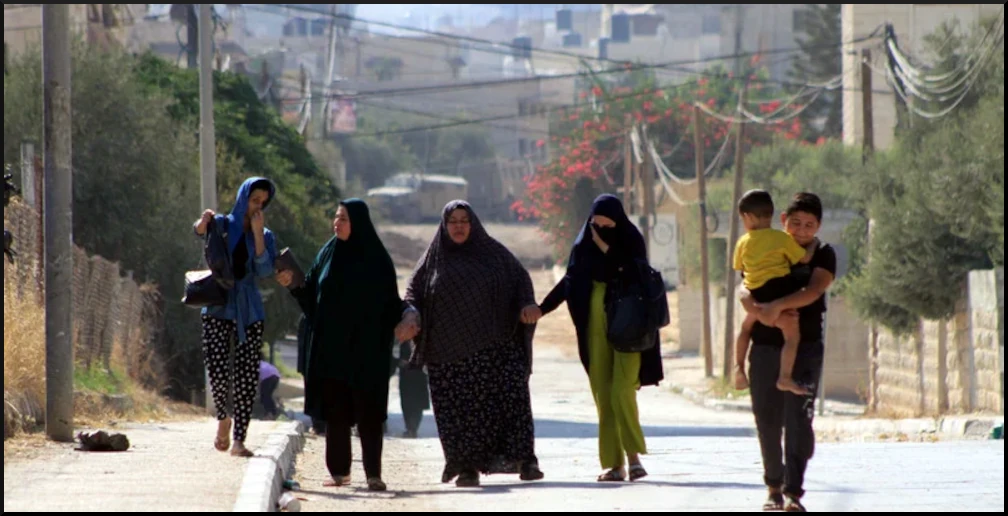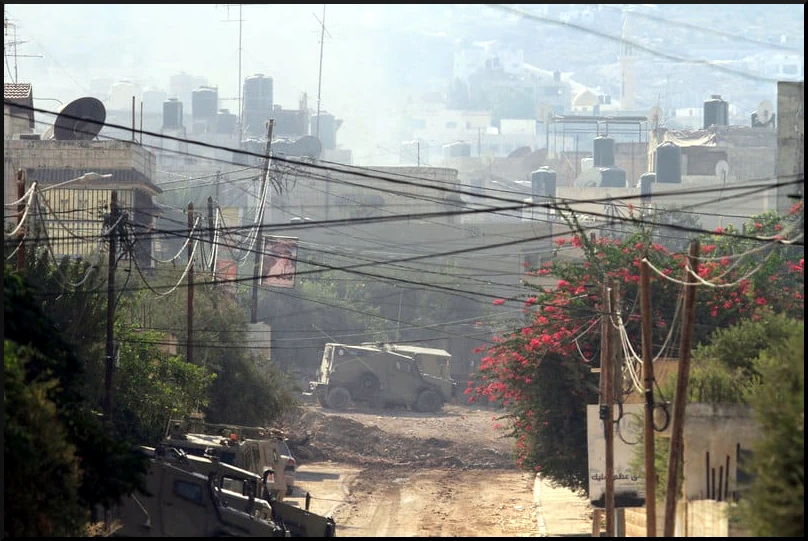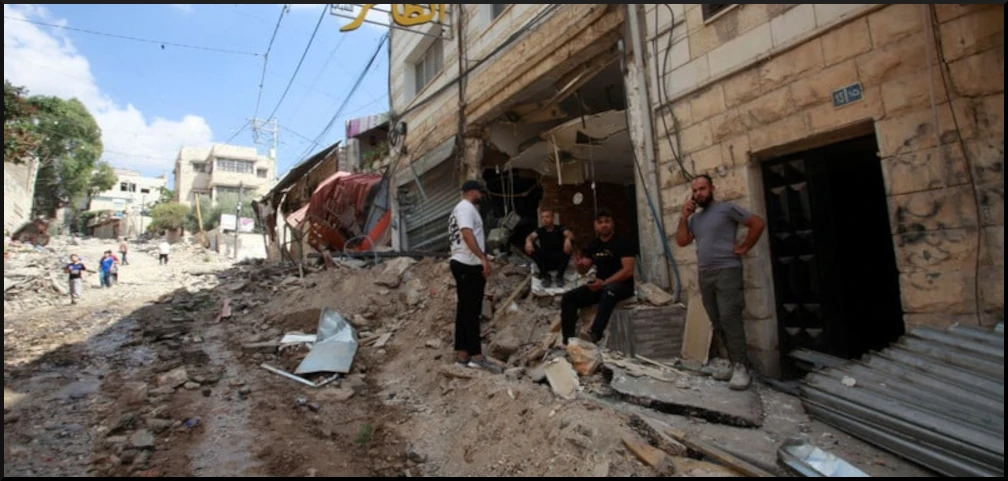by Tamara Nasser, published on Electronic Intifada, September 4, 2024
An Israeli military assault in the occupied West Bank entered its seventh day on Tuesday, destroying the vast majority of the Jenin refugee camp’s road infrastructure in its wake.
The Israeli attack has killed at least 33 Palestinians, including seven children, and injured nearly 130 since 28 August, the Palestinian Authority’s health ministry reported, when Israeli troops launched a deadly wide-scale assault on the Jenin refugee camp, Nur Shams refugee camp east of Tulkarem and the al-Faraa refugee camp in the foothills of the Jordan Valley, south of Tubas.
Hundreds of soldiers, armed with military jeeps, bulldozers and drones, have sealed off cities and refugee camps and inflicted widespread devastation to infrastructure, roads and water networks.
The army has also cut off power.
The raids are under the direction of Shin Bet, Israel’s domestic spying and torture agency.
At least 19 Palestinians have been slaughtered by Israeli forces in the Jenin governorate, four in Tubas, seven in Tulkarem and three in the southern Hebron area, the health ministry reported.
Israel’s assault is said to be the largest since the second intifada more than 20 years ago.
The killings since last Wednesday bring to more than 650 the number of Palestinians killed by Israeli occupation forces and settlers in the occupied West Bank since 7 October. Thousands more have been injured in a surge of Israeli violence dwarfed only by the scale of the slaughter in Gaza.
At least 156 of those killed in the occupied West Bank were children, two of them US citizens.
Attack on Jenin
Despite reports of the informal withdrawal of Israeli troops from the Tulkarem and Tubas areas, they continue to operate in Tulkarem, where they have caused extensive destruction.
Muhammad Abdullah Kanaan, 14, was visiting his older brother alongside his father when Israeli forces launched the assault on the northern occupied West Bank on 28 August. This prevented them from returning to their home in the Tulkarem refugee camp.
When Israeli forces seemed to informally withdraw from the area, Muhammad and his father tried to return home to the camp.
An Israeli sniper stationed in a residential home at the entrance of the camp fired at the boy and his father, striking Muhammad with a bullet in the head from a distance of 250 meters (820 feet) away. The father was injured in his waist.
Israeli forces invaded Tulkarem and its refugee camp with military bulldozers around dawn on 2 September, surrounding hospitals, patrolling the streets and attacking Palestinian residents.
Meanwhile, Israeli forces intensified their attack on Jenin refugee camp, besieging it and leaving it without food, water or electricity.
Israeli forces blew up homes in the camp, which houses 20,000 Palestinians.
Soldiers demolished commercial stores, bulldozed roads and detained and interrogated residents.
Israel’s ongoing assault forced 85 percent of camp residents to flee, the Israeli military estimates, largely to Jenin city.
Those who remained are staying put in their homes, though 80 percent of the camp has no access to water, the Jenin municipality said.
Israel issued an evacuation order to a public hospital in Jenin currently treating 150 patients.
Some restaurants and stores in the area announced that they would be distributing free bread, vegetables and food supplies to residents as Israel’s attacks escalate.

Israeli forces besieged and fired at the home of a “wanted” Palestinian man on Tuesday, targeting it with shells and live ammunition.
Lujain Osama Musleh, a 16-year-old girl, was in her family home around 50 meters (164 feet) away from the home when an Israeli sniper shot her in the head through a window, Defense for Children International-Palestine reported.
Israeli forces then blocked an ambulance from reaching Lujain for about 10 minutes. When she was finally transferred to the Jenin public hospital, she was announced dead on arrival.
On 1 September, Israeli forces chased and shot at two children riding a motorcycle near the entrance of Kafr Dan village west of Jenin.
Abdullah Abdulnaser Masoud, 17, and his 12-year-old cousin Muhammad Mahmoud Masoud were riding on the back of a motorcycle with Abdullah’s 23-year-old brother Amir on Saturday afternoon.
They had just returned from Jenin, which is besieged with no food access, “after delivering bags of bread,” according to a field investigation by DCIP.
Three Israeli military vehicles chased them as they were heading back to their village.
Amir, who was driving the motorcycle, lost control of it and the two children fell to the ground, got up, and continued to run toward the entrance of their village.
About five Israeli soldiers then exited their military vehicles and fired live rounds at the boys from a distance of 40 meters (131 feet). The Israeli bullets struck the 17-year-old in the head, and 12-year-old Muhammad twice in his back, one of the bullets exiting through his chest, killing them both.
Israeli soldiers then prevented ambulances from reaching the boys for 40 minutes, according to DCIP’s investigation.
When the boys reached the hospital, they were both announced dead on arrival.
After killing the two children, Israeli forces then arrested Amir.
Later that same night, Israeli vehicles invaded the village of Silat al-Harithiya, northwest of Jenin, prompting Palestinian residents to confront soldiers in defense of their village.
Two Palestinian children allegedly threw homemade explosive devices toward the vehicles.
Around 40 minutes later, an Israeli drone-fired missile targeted the two children, killing 16-year-old Laith Marwan Shawahneh and severely injuring the other child, who was hospitalized in critical condition, DCIP reported.
Most streets destroyed
Israeli military bulldozers ripped up nearly 70 percent of Jenin’s streets, destroying more than 12 miles of the city’s water and sewage grid, Jenin’s municipality said.
Footage circulated on social media shows bulldozers uprooting roads and destroying storefronts:
تغطية صحفية | جانب من الدمار الذي لحق بالبنية التحتية والشوارع في بلدة كفردان غرب جنين؛ عقب عدوان الاحتلال المتواصل على المنطقة. pic.twitter.com/EGZsmmEZdF
— القسطل الإخباري (@AlQastalps) September 3, 2024
جرافة الاحتلال تقوم بأعمال تدمير وتخريب للبنى التحتية والمحلات التجارية في قرية برقين غرب جنين. pic.twitter.com/ZwABCIJQ6q
— Newpress | نيو برس (@NewpressPs) September 3, 2024
تغطية صحفية: دمار واسع بمنطقة دوار السينما وسط جنين، جرّاء عــ ـــدوان الاحتلال المستمر. pic.twitter.com/E1hADeqDTy
— شبكة قدس الإخبارية (@qudsn) September 2, 2024
The Israeli army says this is done to deter the planting of explosive devices underneath roads by resistance groups.
Palestinians can remotely detonate the explosive devices, which have killed and injured a number of Israeli soldiers in recent months.
These devices have been more widely used by the armed resistance in the northern areas to resist Israeli invasions into their refugee camps and neighborhoods.
Improvised explosive devices “are the primary method of defense of the camps,” says Jon Elmer, contributing editor of The Electronic Intifada.
Israeli bulldozers ravage through the streets, destroying civil infrastructure, commercial stores and residential areas. The enormous vehicles also damage water and sewage networks and impede movement, including ambulances trying to reach the injured.
Though this destruction of critical infrastructure is carried out under the guise of uprooting explosive devices from roads, Palestinians have interpreted these practices to be vengeful policies of collective punishment.

Israeli military bulldozers have ripped up 70 percent of Jenin’s streets, destroying more than 12 miles of the city’s water and sewage grid, 31 August. Mohammed Nasser APA images
Moreover, it’s not clear that this tactic is effective in curbing the threat of improvised explosive devices, which have improved in recent months.
“By turning the roads into dirt, it makes it easier and quicker to bury the explosives in the ground because there’s no asphalt over it, and then they can be concealed underneath the dug-up dirt,” says Elmer.
“The Israelis say that this gives them freedom to operate, but in reality, it makes it easier to bury the weapons themselves – so it’s really just a punitive measure,” Elmer added.
“It’s a penalty for the camps for their method of defending themselves.”
A Times of Israel journalist asked an Israeli engineering officer if this makes it more challenging to locate new bombs planted in bombed out roads in the future, to which he said it was indeed “a dilemma.”
One Israeli soldier was killed on 27 August during confrontations between Israeli troops and armed resistance fighters in Jenin, who have been defending the refugee camp during the ongoing assault.
“Mini-Gaza”
Calls by Israeli leaders to turn the West Bank into “mini-Gaza” are “translating into military operations,” the United Nations human rights office warned on Monday.
“Israel’s genocidal violence risks leaking out of Gaza and into the occupied Palestinian territory as a whole,” stated Francesca Albanese, the UN special rapporteur on the West Bank and Gaza.
“There is mounting evidence that no Palestinian is safe under Israel’s unfettered control.”
Albanese warned that “apartheid Israel is targeting Gaza and the West Bank simultaneously, as part of an overall process of elimination, replacement and territorial expansion.”
“The long-standing impunity granted to Israel is enabling the de-Palestinization of the occupied territory, leaving Palestinians at the mercy of the forces pursuing their elimination as a national group.”
*Featured Image: Palestinians inspect damage of streets torn up by Israeli bulldozers after an Israeli raid in the eastern neighborhood of Jenin city in the occupied West Bank on 1 September. APA images
